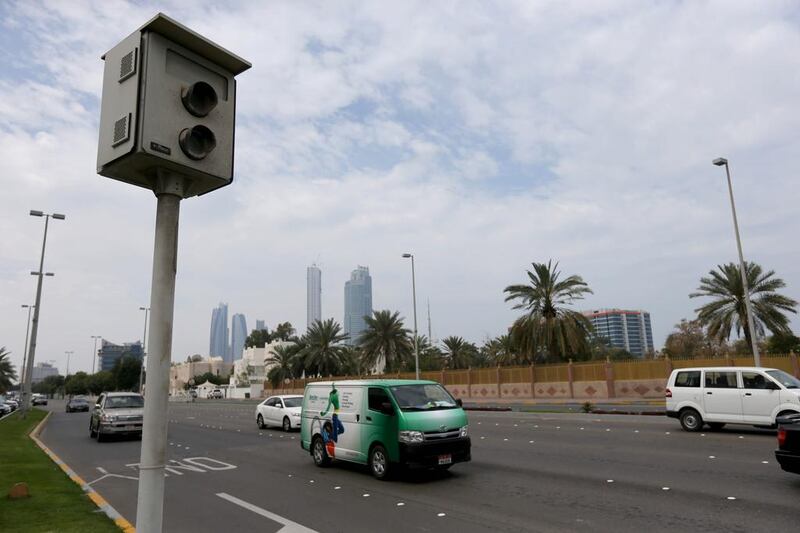ABU DHABI // Increasing the number of mobile speed cameras is one way to help curb speeding on motorways and through junctions, experts say.
It is common practice for motorists to slow down as they approach a fixed speed camera and pick up speed when they drive past it, they say.
Simon Labbett, regional director of Transport Research Laboratory, said authorities should consider using different types of enforcement, including "point-to-point" cameras, to reduce speeding at specific locations.
"These cameras are intended to control speed over a longer distance, not just where the camera is located," Mr Labbett said.
"These systems have been shown to deliver highly effective results of compliance."
Point-to-point radar calculates the average speed of vehicles based on the distance between two points and the vehicle's travel time.
"These are best used where there is a real need to seek speed compliance, such as through a work zone where the risk of injury is greater," Mr Labbett said.
More mobile speed cameras should be used "to add the element of unpredictability of speed checks", said Thomas Edelmann, founder of the website Road Safety UAE.
"Drivers try to trick the system by speeding and slowing down when they see radars," Mr Edelmann said. "Slowing down or abrupt braking as one approaches a radar poses a risk to the driver and other vehicles behind him or her."
Public education campaigns to support speed enforcement can help to change driver behaviour, Mr Labbett said.
"Change of driver behaviour to the issue of speeding is more likely to be sustainable if the public understands the danger of speeding and chooses to slow down," he said.
Glenn Havinoviski, an Abu Dhabi traffic expert who commutes daily between Dubai and Abu Dhabi, said the density of cameras in Dubai led to greater driver compliance.
"The more cameras there are, the less likely someone is going to speed, then slow down, then speed again, unless one has no problems paying hundreds of fines every week," Mr Havinoviski said.
A driver can also be pulled over and issued a fine by a traffic policeman, who use both marked and unmarked patrol cars.
"I've seen a heightened police presence on Saadiyat highway and the road towards Mussaffah when you drive through Salam Street last year," said Ramesh Menon, an Abu Dhabi resident for 25 years.
"But these days many have resorted to speeding, tailgating and reckless driving since no one's there to stop and fine them."
Safety, not profit, is behind speed control. In November, Capt Ahmed Al Muheri, the head of traffic safety, said Abu Dhabi Police did not seek any financial gain by issuing traffic fines.
The new radars on Abu Dhabi's motorways were installed to maintain drivers' safety and to enhance compliance with traffic laws.
"This measure aims to ensure people's safety and to maintain public property, as evidence has shown that most accidents occur as a result of a traffic violation," Capt Al Muheri said.
In January, 3,167 traffic breaches were logged by the new no-flash cameras at several junctions around Abu Dhabi.
The cameras are programmed to detect several different traffic offences including driving through red lights, blocking pedestrian paths and exceeding the speed limit.
They are part of the traffic department's monitoring project, which started in 2012 with cameras at more than 150 junctions in Abu Dhabi, Al Ain and the Western Region.
Jasim Al Ali, an Emirati mechanical engineering student at Khalifa University, said motorists should understand radars were for their own safety.
Mr Al Ali said he once paid Dh300 for speeding in Abu Dhabi, but generally followed traffic rules.
"Radars are being rolled out across the emirate to keep tabs on people's reckless driving behaviour, including those who don't follow the traffic rules and exceed the speed limit," he said.
"They are installed to educate motorists, not as a means to extract money from them."
rruiz@thenational.ae
anwar@thenational.ae
Abu Dhabi radar traps aim to cut speed and increase safety on roads
Introducing point-to-point systems and increasing the number of mobile speed cameras can help curb speeding, keeping motorists from speeding up after they pass a camera.

Editor's picks
More from the national





